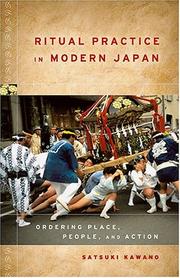| Listing 1 - 9 of 9 |
Sort by
|
Book
ISBN: 9780824860882 Year: 2010 Publisher: Honolulu
Abstract | Keywords | Export | Availability | Bookmark
 Loading...
Loading...Choose an application
- Reference Manager
- EndNote
- RefWorks (Direct export to RefWorks)
Book
ISBN: 9780824874513 Year: 2005 Publisher: Honolulu
Abstract | Keywords | Export | Availability | Bookmark
 Loading...
Loading...Choose an application
- Reference Manager
- EndNote
- RefWorks (Direct export to RefWorks)
Multi
ISBN: 9780824860882 9780824833725 Year: 2010 Publisher: Honolulu, Hawaii University of Hawaii Press
Abstract | Keywords | Export | Availability | Bookmark
 Loading...
Loading...Choose an application
- Reference Manager
- EndNote
- RefWorks (Direct export to RefWorks)

ISBN: 9780824874513 9780824828776 Year: 2005 Publisher: Honolulu, Hawaii University of Hawaii Press
Abstract | Keywords | Export | Availability | Bookmark
 Loading...
Loading...Choose an application
- Reference Manager
- EndNote
- RefWorks (Direct export to RefWorks)

ISBN: 0824828771 082487451X Year: 2005 Publisher: Honolulu : University of Hawaii Press,
Abstract | Keywords | Export | Availability | Bookmark
 Loading...
Loading...Choose an application
- Reference Manager
- EndNote
- RefWorks (Direct export to RefWorks)
National surveys indicate that most Japanese, while professing no religious commitment, frequently perform rituals: They regularly tend their family home altars, look after family graves, participate in neighborhood festivals, and visit Shinto shrines and Buddhist temples. Are these rituals mere formalities? Based on fourteen months of fieldwork in Kamakura city near Tokyo, Satsuki Kawano examines the power of ritual and its relevance for modern urbanites. She reveals the indebtedness of ritual to forms that create an elevated context and infuse the mundane with a sense of moral order. By employing acts and environments common to everyday life, Kawano argues, ritual evokes morally positive values such as purity, gratitude, respect, and indebtedness. Rather than objectify morality in a sacred text or religious doctrine, ritual embodies and emplaces a sense of what it means to be a good person and creates moments of personal significance and engagement. In Kamakura, belief is therefore a consequence and not a prerequisite of ritual engagement. Ritual Practice in Modern Japan effectively challenges the widespread assumption that ritual in non-Western societies has little moral significance and that, with modernization, "traditional" practices inevitably disappear. This is a book that will interest scholars and students of cultural anthropology, ritual studies, and Japanese studies.
Rites and ceremonies --- Festivals --- Fasts and feasts --- Kamakura-shi (Japan) --- Kamakura-shi (Japan) --- Religious life and customs. --- Social life and customs.
Book
ISBN: 9780824838690 9780824838683 Year: 2014 Publisher: Honolulu : University of Hawaiʻi Press,
Abstract | Keywords | Export | Availability | Bookmark
 Loading...
Loading...Choose an application
- Reference Manager
- EndNote
- RefWorks (Direct export to RefWorks)
Book
ISBN: 0824833724 0824860888 0824870859 1441671404 Year: 2010 Publisher: University of Hawai'i Press
Abstract | Keywords | Export | Availability | Bookmark
 Loading...
Loading...Choose an application
- Reference Manager
- EndNote
- RefWorks (Direct export to RefWorks)
Book

ISBN: 0824868897 082483870X 9780824838706 0824838688 Year: 2014 Publisher: Honolulu
Abstract | Keywords | Export | Availability | Bookmark
 Loading...
Loading...Choose an application
- Reference Manager
- EndNote
- RefWorks (Direct export to RefWorks)
What are people's life experiences in present-day Japan? This timely volume addresses fundamental questions vital to understanding Japan in the first decade of the twenty-first century. Its chapters collectively reveal a questioning of middle-class ideals once considered the essence of Japaneseness. In the postwar model household a man was expected to obtain a job at a major firm that offered life-long employment; his counterpart, the "professional" housewife, managed the domestic sphere and the children, who were educated in a system that provided a path to mainstream success. In the past twenty years, however, Japanese society has seen a sharp increase in precarious forms of employment, higher divorce rates, and a widening gap between haves and have-nots. Contributors draw on rich, nuanced fieldwork data collected during the 2000s to examine work, schooling, family and marital relations, child rearing, entertainment, lifestyle choices, community support, consumption and waste, material culture, well-being, aging, death and memorial rites, and sexuality. The voices in these pages vary widely: They include schoolchildren, teenagers, career women, unmarried women, young mothers, people with disabilities, small business owners, organic farmers, retirees, and the elderly.
SOCIAL SCIENCE / Anthropology / Cultural & Social. --- Japan --- al-Yābān --- Giappone --- Government of Japan --- Iapōnia --- I︠A︡ponii︠a︡ --- Japam --- Japani --- Japão --- Japon --- Japonia --- Japonsko --- Japonya --- Jih-pen --- Mư̄ang Yīpun --- Nihon --- Nihon-koku --- Nihonkoku --- Nippon --- Nippon-koku --- Nipponkoku --- Prathēt Yīpun --- Riben --- State of Japan --- Yābān --- Yapan --- Yīpun --- Zhāpān --- Япония --- اليابان --- يابان --- 日本 --- 日本国 --- Social conditions --- Economic conditions --- Jepun --- Yapon --- Yapon Ulus --- I︠A︡pon --- Япон --- I︠A︡pon Uls --- Япон Улс
Digital

ISBN: 9780824838706 9780824838683 Year: 2014 Publisher: Honolulu, Hawaii University of Hawaii Press
Abstract | Keywords | Export | Availability | Bookmark
 Loading...
Loading...Choose an application
- Reference Manager
- EndNote
- RefWorks (Direct export to RefWorks)
| Listing 1 - 9 of 9 |
Sort by
|

 Search
Search Feedback
Feedback About UniCat
About UniCat  Help
Help News
News